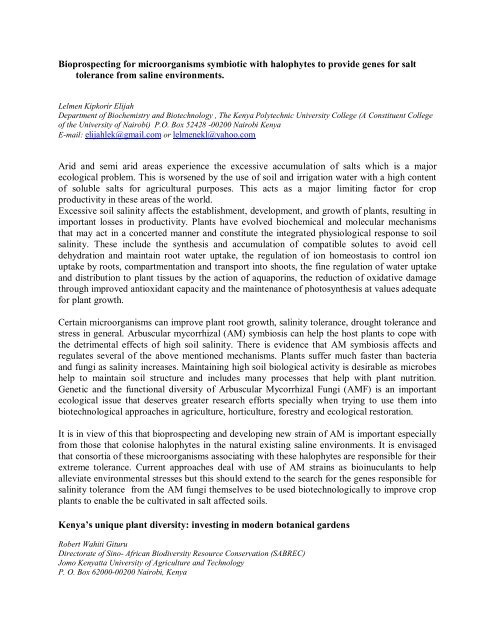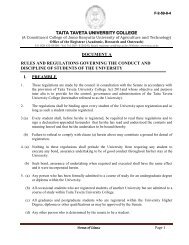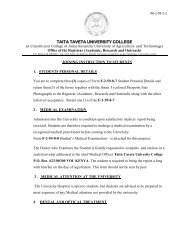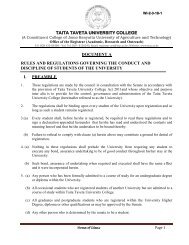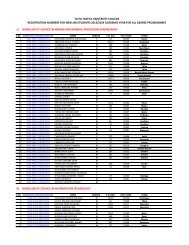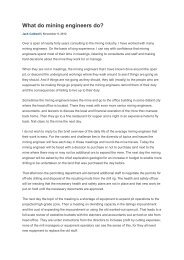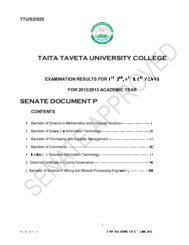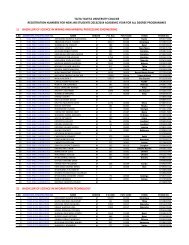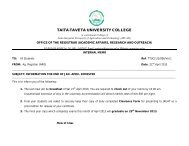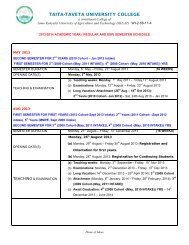Bioprospecting for microorganisms symbiotic with halophytes to provide genes for salttolerance from saline environments.Lelmen Kipkorir ElijahDepartment <strong>of</strong> Biochemistry and Biotechnology , The Kenya Polytechnic <strong>University</strong> <strong>College</strong> (A Constituent <strong>College</strong><strong>of</strong> the <strong>University</strong> <strong>of</strong> Nairobi) P.O. Box 52428 -00200 Nairobi KenyaE-mail: elijahlek@gmail.com or lelmenekl@yahoo.comArid and semi arid areas experience the excessive accumulation <strong>of</strong> salts which is a majorecological problem. This is worsened by the use <strong>of</strong> soil and irrigation water with a high content<strong>of</strong> soluble salts for agricultural purposes. This acts as a major limiting factor for cropproductivity in these areas <strong>of</strong> the world.Excessive soil salinity affects the establishment, development, and growth <strong>of</strong> plants, resulting inimportant losses in productivity. Plants have evolved biochemical and molecular mechanismsthat may act in a concerted manner and constitute the integrated physiological response to soilsalinity. These include the synthesis and accumulation <strong>of</strong> compatible solutes to avoid celldehydration and maintain root water uptake, the regulation <strong>of</strong> ion homeostasis to control ionuptake by roots, compartmentation and transport into shoots, the fine regulation <strong>of</strong> water uptakeand distribution to plant tissues by the action <strong>of</strong> aquaporins, the reduction <strong>of</strong> oxidative damagethrough improved antioxidant capacity and the maintenance <strong>of</strong> photosynthesis at values adequatefor plant growth.Certain microorganisms can improve plant root growth, salinity tolerance, drought tolerance andstress in general. Arbuscular mycorrhizal (AM) symbiosis can help the host plants to cope withthe detrimental effects <strong>of</strong> high soil salinity. There is evidence that AM symbiosis affects andregulates several <strong>of</strong> the above mentioned mechanisms. Plants suffer much faster than bacteriaand fungi as salinity increases. Maintaining high soil biological activity is desirable as microbeshelp to maintain soil structure and includes many processes that help with plant nutrition.Genetic and the functional diversity <strong>of</strong> Arbuscular Mycorrhizal Fungi (AMF) is an importantecological issue that deserves greater research efforts specially when trying to use them intobiotechnological approaches in agriculture, horticulture, forestry and ecological restoration.It is in view <strong>of</strong> this that bioprospecting and developing new strain <strong>of</strong> AM is important especiallyfrom those that colonise halophytes in the natural existing saline environments. It is envisagedthat consortia <strong>of</strong> these microorganisms associating with these halophytes are responsible for theirextreme tolerance. Current approaches deal with use <strong>of</strong> AM strains as bioinuculants to helpalleviate environmental stresses but this should extend to the search for the genes responsible forsalinity tolerance from the AM fungi themselves to be used biotechnologically to improve cropplants to enable the be cultivated in salt affected soils.Kenya’s unique plant diversity: investing in modern botanical gardensRobert Wahiti GituruDirectorate <strong>of</strong> Sino- African Biodiversity Resource Conservation (SABREC)Jomo Kenyatta <strong>University</strong> <strong>of</strong> Agriculture and TechnologyP. O. Box 62000-00200 Nairobi, Kenya
gituru67@yahoo.com Tel: +254 729937499Convention on Biological Diversity (CBD) defines Biodiversity as the variability among livingorganisms from all sources including, inter alia, terrestrial, marine and other aquatic ecosystemsand the ecological complexes <strong>of</strong> which they are part; this includes diversity within species,between species and <strong>of</strong> ecosystems. Kenya is endowed with great plant diversity. This isattributed to the diverse local ecosystems and habitats. The flora <strong>of</strong> Kenya also has high presence<strong>of</strong> endemic species. Biodiversity can indeed help alleviate hunger and poverty, can promotehuman health, and be the basis for ensuring freedom and equity for all. Changes in the lastseveral decades in human activities have had significant adverse effects on plant biodiversity.The demand for more land to facilitate rain-fed agriculture has caused diminished woodlands andforests. Other factors including urbanization, rising human population, uncontrolled spread <strong>of</strong>invasive species, and deforestation have exerted pressure on plant biodiversity. Furthermore theanticipated developments in Kenya‟s ambitious development and growth strategy the Vision2030 will precipitate habitat loss and transformation. The aims and objectives <strong>of</strong> conservationmanagement strategies for plant biodiversity may be realized by establishment <strong>of</strong> botanicalgardens. Currently botanic gardens (and arboreta) are defined as "botanic institutions holdingdocumented collections <strong>of</strong> living plants for purpose <strong>of</strong> scientific research, conservation, displayand education" Gardens are and have always been associated with a sense <strong>of</strong> peace and serenity.Gardens must have played a vital role for the survival <strong>of</strong> communities in human evolution. Theyserved as an indispensable source <strong>of</strong> food and medicinal herbs, shelter and clothing. Gardens theworld over have been recognized as tangible resources for the improvement <strong>of</strong> humans. Botanicgardens are innovative institutions that can help local populations in many ways. They canfacilitate introduction <strong>of</strong> new economically viable species <strong>of</strong> plants, create a pleasant and safeenvironment, improve and beautify settlements, green cities, restore and repatriate rare plants aswell as contribution to long term continuous education and public awareness, among othervalues. Both the tangible (material) and intangible (non –material) resources <strong>of</strong> botanic gardensare equally valuable for the sustainable development and linking biodiversity with publiceducation and other potential benefits such as nutrition, healthcare, poverty alleviation, socioecologicaland economical benefits for communities including commercialization. The world‟slargest international plant conservation network, the Botanic Gardens Conservation International(BGCI) has initiated a worldwide project review <strong>of</strong> the role <strong>of</strong> botanic gardens in linkingbiodiversity with four selected aspects <strong>of</strong> human-well-being namely nutrition, healthcare,poverty alleviation, community welfare. Gardens also play a role in the spiritual lives <strong>of</strong> manycommunities worldwide. Almost every ethnic community worldwide has plants representingtheir traditions and symbols. There exists a skewed distribution <strong>of</strong> botanic gardens in the worldtoday. About 60% <strong>of</strong> the world‟s botanic gardens are located in the Northern Hemisphere(Europe, North America, part <strong>of</strong> Asia). Ironically, the sites with the highest biodiversity are inthe south. Botanic gardens have a role to play in globalization owing to their place in bothintellectual and cultural centers. Every botanic garden, based on available resources and demandsfrom potential consumers, identifies the strategy and directions <strong>of</strong> development <strong>of</strong> scientific andeducational projects and also identifies its socio – ecological role in the region. The resultingimpact <strong>of</strong> any botanic garden on the society and on the environment is a function <strong>of</strong> its positionwithin the ministry <strong>of</strong> government, municipality, corporation or charity as well as its existinglinks with the public. Botanic gardens can effectively serve the needs <strong>of</strong> Academia while alsohonoring natural and cultural heritage. Botanic gardens working in field introduction and


